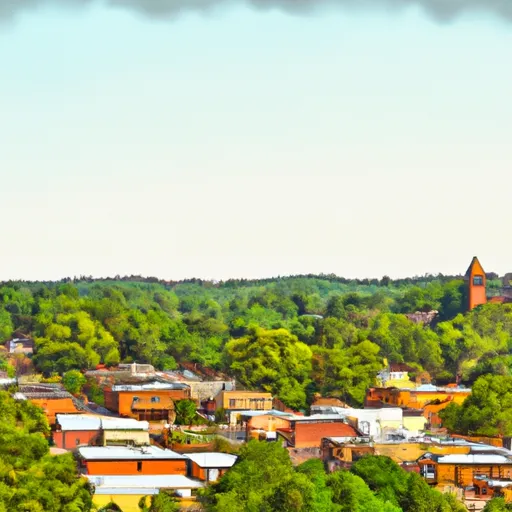-
 Snoflo Premium
Snoflo Premium
Get unlimited access to all our content
With no Ad interruptions! - Start Your Free Trial Login with existing account
Monticello
Eden Index
Climate
8.2
•
Recreation
3.4
•
Community
2.3
•
Safeguard
5.0/10

Monticello, Georgia, is a picturesque town located in Jasper County, approximately 60 miles southeast of Atlanta. The climate in Monticello is characterized as humid subtropical, with mild winters and hot, humid summers. The average annual temperature is around 64°F, with highs reaching the mid-90s in summer and lows dipping into the 30s in winter. The area receives approximately 50 inches of rainfall annually, with the wettest months being March and December.
Monticello is blessed with abundant water resources. The town is surrounded by beautiful lakes, including Jackson Lake and Lake Sinclair, offering opportunities for boating, fishing, and water sports. The Ocmulgee River also runs nearby, providing additional recreational activities such as canoeing and kayaking.
Outdoor enthusiasts can also explore the picturesque Piedmont National Wildlife Refuge, located just north of Monticello. Spanning over 35,000 acres, the refuge offers opportunities for hiking, birdwatching, hunting, and fishing. Visitors can spot various wildlife species, including white-tailed deer, wild turkeys, and waterfowl.
In conclusion, Monticello, Georgia, boasts a pleasant climate, abundant water resources, and diverse outdoor recreation opportunities, making it an ideal destination for nature lovers and those seeking outdoor adventures.
What is the Eden Index?
The Snoflo Eden Index serves as a comprehensive rating system for regions, evaluating their desirability through a holistic assessment of climate health, outdoor recreation opportunities, and natural disaster risk, acknowledging the profound impact of these factors on livability and well-being.
Climate Health Indicator (CHI): 8.2
Monticello receives approximately
1187mm of rain per year,
with humidity levels near 87%
and air temperatures averaging around
17°C.
Monticello has a plant hardyness factor of
8, meaning
plants and agriculture in this region tend to thrive here all year round.
By considering the ideal temperature range, reliable water supplies, clean air, and stable seasonal rain or snowpacks, the Climate Health Indicator (CHI) underscores the significance of a healthy climate as the foundation for quality living.
A healthy climate is paramount for ensuring a high quality of life and livability in a region, fostering both physical well-being and environmental harmony. This can be characterized by ideal temperatures, reliable access to water supplies, clean air, and consistent seasonal rain or snowpacks.
Weather Forecast
Streamflow Conditions
Altamaha
Area Rivers
Altamaha
Snowpack Depths
Altamaha
Reservoir Storage Capacity
Altamaha
Groundwater Levels
Recreational Opportunity Index (ROI): 3.4
The Recreational Opportunity Index (ROI) recognizes the value of outdoor recreational options, such as parks, hiking trails, camping sites, and fishing spots, while acknowledging that climate plays a pivotal role in ensuring the comfort and consistency of these experiences.
Access to outdoor recreational opportunities, encompassing activities such as parks, hiking, camping, and fishing, is crucial for overall well-being, and the climate plays a pivotal role in enabling and enhancing these experiences, ensuring that individuals can engage in nature-based activities comfortably and consistently.
Camping Areas
| Campground | Campsites | Reservations | Toilets | Showers | Elevation |
|---|---|---|---|---|---|
| Warner Robins AFB Military | None | 348 ft | |||
| Arrowhead County Park | None | 390 ft | |||
| Dames Ferry County Park | None | 424 ft | |||
| Fort Yargo State Park | None | 914 ft | |||
| Newton Factory Shoals Rec Area | None | 608 ft | |||
| Indian Springs State Park | None | 503 ft | |||
| Hard Labor Creek State Park | None | 713 ft | |||
| Claystone County Park | None | 410 ft | |||
| Georgia Veterans State Park | None | 273 ft | |||
| Central City Park - State Fairgrounds | None | 295 ft |
Nearby Ski Areas
Catastrophe Safeguard Index (CSI):
The Catastrophe Safeguard Index (CSI) recognizes that natural disaster risk, encompassing floods, fires, hurricanes, and tornadoes, can drastically affect safety and the overall appeal of an area.
The level of natural disaster risk in a region significantly affects safety and the overall livability, with climate change amplifying these risks by potentially increasing the frequency and intensity of events like floods, fires, hurricanes, and tornadoes, thereby posing substantial challenges to community resilience and well-being.
Community Resilience Indicator (CRI): 2.3
The Community Resilience Indicator (CRI) recognizes that education, healthcare, and socioeconomics are crucial to the well-being of a region. The CRI acknowledges the profound impact of these elements on residents' overall quality of life. By evaluating educational resources, healthcare accessibility, and economic inclusivity, the index captures the essential aspects that contribute to a thriving community, fostering resident satisfaction, equity, and social cohesion.

